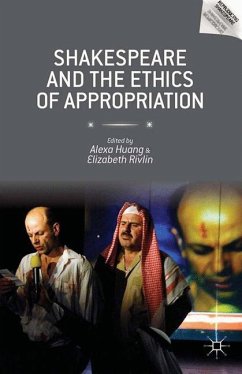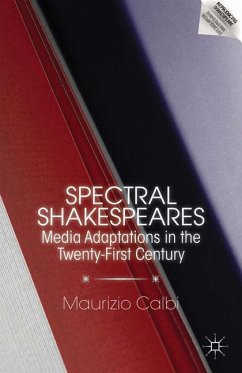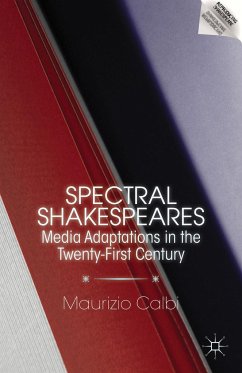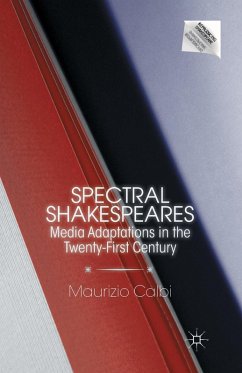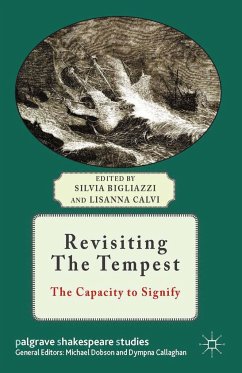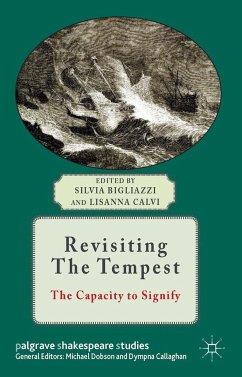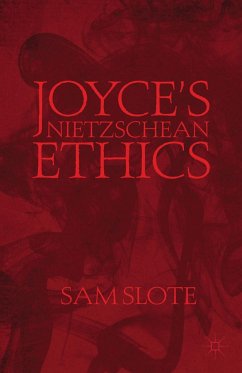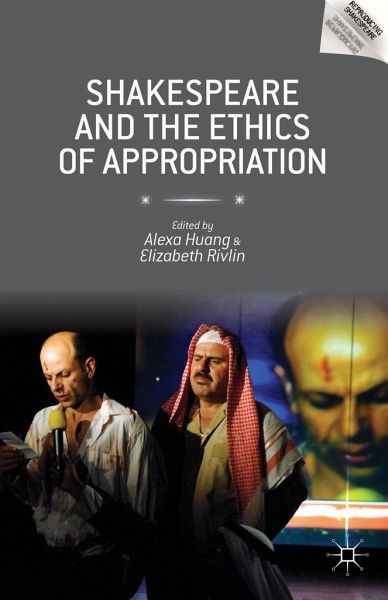
Shakespeare and the Ethics of Appropriation
Versandkostenfrei!
Versandfertig in 6-10 Tagen
Weitere Ausgaben:

PAYBACK Punkte
38 °P sammeln!





Making an important new contribution to rapidly expanding fields of study surrounding the adaptation and appropriation of Shakespeare, Shakespeare and the Ethics of Appropriation is the first book to address the intersection of ethics, aesthetics, authority, and authenticity.
Thomas Cartelli, Muhlenberg College, USA Sheila T. Cavanagh, Emory University, USA Brinda Charry, Keene State College, USA Christy Desmet, University of Georgia, USA Douglas M. Lanier, University of New Hampshire, USA Courtney Lehmann, University of the Pacific, USA Margaret Litvin, Boston University, USA Adrian Streete, Queen's University Belfast, Northern Ireland Robert Sawyer, East Tennessee State University, USA Gitanjali Shahani, San Francisco State University, USA Ema Vyroubalová, Trinity College, Dublin, Ireland Yukari Yoshihara, University of Tsukuba, Japan
Produktdetails
- Reproducing Shakespeare
- Verlag: Palgrave Macmillan / Palgrave Macmillan US / Springer Palgrave Macmillan
- Artikelnr. des Verlages: 978-1-137-37576-6
- 2014 edition
- Seitenzahl: 281
- Erscheinungstermin: 23. Oktober 2014
- Englisch
- Abmessung: 145mm x 216mm x 20mm
- Gewicht: 478g
- ISBN-13: 9781137375766
- ISBN-10: 1137375760
- Artikelnr.: 41611951
Herstellerkennzeichnung
Libri GmbH
Europaallee 1
36244 Bad Hersfeld
gpsr@libri.de
"This thoughtful, imaginative, and generous collection takes us beyond the simple identification of Shakespearean appropriation as a field of study in order to place Shakespeare at the center of present-day manifestations of empire, performance, and the humanities. Text, author, and reader form and inform each other in an ethical process, Rivlin and Huang suggest, that mutually constitutes subjectivity and ethical identity. Individual essays productively disagree about the degree of power afforded to each point of this triangular relationship - text, author, reader - but communicate an urgent and compelling need for adaptors, readers, and viewers to reflect upon what 'Shakespeare' means in each of these context and to consider the social
Mehr anzeigen
and ethical stakes of each of these positions." - Sujata Iyengar, Professor of English, University of Georgia, USA
"This theoretically-sophisticated, cosmopolitan, and forward-looking collection of essays simultaneously questions andcelebrates the ethical implications of a manifest 'global Shakespeare.' Huang and Rivlin reimagine appropriation of Shakespeare as itself a form of intersubjective and intercultural dialogue, in the tradition of moral philosophers such as Buber and Levinas, as well as political theorists such as Appiah, Nussbaum, and Taylor. A truly international team of contributors addresses the moral stakes of practices such as translation and intercultural performance; new concepts of interpersonal agency, community, and relatedness serve to illuminate a remarkable array of recent creative adaptations of Shakespeare." - Patrick Gray, Lecturer in Shakespeare and Renaissance Literature, Durham University, UK
"This theoretically-sophisticated, cosmopolitan, and forward-looking collection of essays simultaneously questions andcelebrates the ethical implications of a manifest 'global Shakespeare.' Huang and Rivlin reimagine appropriation of Shakespeare as itself a form of intersubjective and intercultural dialogue, in the tradition of moral philosophers such as Buber and Levinas, as well as political theorists such as Appiah, Nussbaum, and Taylor. A truly international team of contributors addresses the moral stakes of practices such as translation and intercultural performance; new concepts of interpersonal agency, community, and relatedness serve to illuminate a remarkable array of recent creative adaptations of Shakespeare." - Patrick Gray, Lecturer in Shakespeare and Renaissance Literature, Durham University, UK
Schließen
Für dieses Produkt wurde noch keine Bewertung abgegeben. Wir würden uns sehr freuen, wenn du die erste Bewertung schreibst!
Eine Bewertung schreiben
Eine Bewertung schreiben
Andere Kunden interessierten sich für




